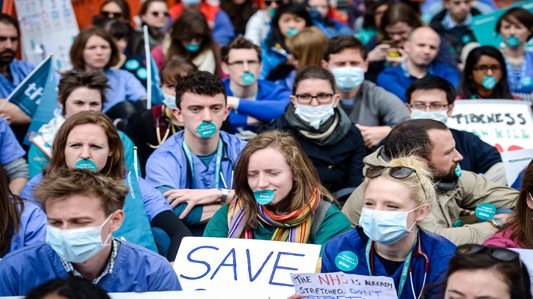If you have an operation booked on September 12th the chances are that you’d better start thinking about trying to book another date.
Or, indeed, if you’re booked in on any other day that week. The junior doctors are going on strike again and this time it’s not for 48 hours as it was earlier this year. It’s five days – with more to follow if the dispute isn’t settled. Are they right to strike?
At issue is the insistence by the health secretary Jeremy Hunt last year that the NHS should be a “seven days a week” service in every sense – the standard of care at weekends should be indistinguishable from that delivered during the week – and the contract between junior doctors and the NHS should make that possible. The doctors said they were already working a seven-day week, but the new contract would put them under intolerable pressure and ultimately patients would suffer. After many month of negotiation, five separate walkouts by the doctors and the intervention of ACAS an agreement was finally reached with the BMA last May. It was peace in our time – or so it seemed. But when the BMA presented the new contract to the doctors they voted against it by 58% to 42%. Mr Hunt has reacted to this new strike threat by saying a deal has been done and the contract will be imposed. Cue more discord.
The BMA says that over the past two months it has made repeated attempts to “work constructively” with the government” to address outstanding areas of concern but the government will not budge. Those concerns include the effects the new contracts will have on part-time staff, mostly women, and the effects they will have on junior doctors who have to work the most weekends. They claim there is already a shortage of doctors in certain specialties and they are the ones who will come under the most pressure.
At the heart of the dispute is the proposal to change what constitutes “unsocial” hours into normal working hours. At the moment the doctors can claim overtime for working from 7.00am until 5.00pm on Saturdays, but that would be deemed a normal working day and there would be no overtime payments. Instead there would be a pay rise which Mr Hunt says would compensate.
Dr Ellen McCourt, who chairs the BMA junior doctors’ committee, says they have been left with no choice: “This contract will be in place for many years. It will have a direct impact on patient care and whether we can attract and keep enough doctors in the NHS. It is too important to be rushed to meet a political deadline”.
For its part, the Department of Health has accused the BMA of a politically motivated response that will be “immensely damaging for vulnerable patients”. The spokeswoman claimed that the BMA must be “the first union in history to call for strike action against a deal which they themselves said was a good one”. She added: “Co-operation not confrontation is the way forward to make sure the patients get the best treatment.
When I spoke to Jeremy Hunt on the Today programme he told me the BMA was inflicting the worst doctors’ strike in NHS history. He said he is prepared to continue negotiations: “It is cooperation and dialogue and not confrontation and strikes, which are going to cause absolute misery to hundreds of thousands of families up and down this country”. Theresa May said the BMA should be “putting patients first – not playing politics”.
What is not clear yet is how much support from the public the junior doctors will have if they go ahead with a five-day strike. Patients’ organisations have called for both sides to restart negotiations. The chief executive of the Patients’ Association, Katherine Murphy, said her association was “gravely troubled” at the catastrophic impact the strike would have on patients and their families as winter approaches. Roy Lilley, the health policy analyst and former chairman of an NHS trust, said he suspects support for the doctors is ebbing away. The BMA Council itself is divided. Although it supported the call for a five-day strike, it did so by the smallest of margins: 16 votes to 14. Its chairman, Dr Mark Porter, said the decision was made “after long and difficult debates”
What is your view? Do you think the junior doctors were right when they rejected the contract that had been agreed by their own negotiators and do you accept their claim that they are acting out of concern for the long-term wellbeing of the NHS. Or do you agree with their critics who say they are just doing it for the money? Or do you share the doctors’ view that Jeremy Hunt has simply failed to recognise the long-term damage that would be done to the NHS if junior doctors feel they have been betrayed? And what do you make of the argument that says different rules should apply to doctors when it comes to taking industrial action because our lives are in their hands?










